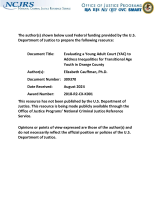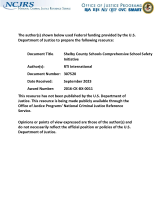County
Incarceration and Reform in Cook County, Illinois
Evaluating the impact of Medication for Opioid Use Disorder Treatment Policies in California Jails
Jail Overcrowding and Pretrial Detention - An Evaluation of Program Alternatives
Assessing the Impact of Dade County's Felony Drug Court: Executive Summary
Development of Bail/Pretrial Release Guidelines in Maricopa County Superior Court, Dade County Circuit Court and Boston Municipal Court
Labor Trafficking in Construction and Hospitality Survey Findings: Summit County
Responding to Intimate Partner Violence Related Strangulation Integrating Policy, Practice, and Rese
This webinar examines the problem of Intimate Partner Violence Strangulation and an innovative response policy. The presentation will include an overview of the nature and extent of strangulation, its dangers, and adverse medical consequences followed by a review of a Strangulation Ordinance in Burleson, Texas that mandates extensive training for first responders and a city-wide response protocol for strangulation detection and investigation, documentation of strangulation signs and symptoms, medical assistance, and service referrals for strangulation survivors.
See the YouTube Terms of Service and Google Privacy Policy
Evaluating a Young Adult Court (YAC) to Address Inequalities for Transitional Age Youth in Orange County
Just Science Podcast: Just Public Health and Safety Data Sharing in Georgia
Understanding the Impact of COVID-19 on Victim Services
The COVID-19 pandemic had a detrimental impact on communities across the nation and significantly affected various aspects of individuals’ lives. One of the negative impacts was an increase in gender-based violence accompanied by shifting barriers to accessing services and support. Victims and victim service providers faced various challenges dealing with the increase in need for services, navigating barriers to help-seeking, and addressing logistical issues.
See the YouTube Terms of Service and Google Privacy Policy
Immigrant Threat or Institutional Context? Examining Police Agency and County Context and the Implementation of the 287(g) Program
Effect of Growth in Foreign Born Population Share on County Homicide Rates: A Spatial Panel Approach
A case study for local data surveillance in opioid overdose fatalities in Cuyahoga County, OH 2016-2020
Shelby County Schools Comprehensive School Safety Initiative
Caring Connections for Youth: Evaluation of a Countywide Pre-Arrest Diversion Initiative to Reduce Racial/Ethnic Disparities
Mapping the Continuum of Support for Violent Extremism in the United States
Can Science Enhance Equity? Findings and Implications From a Study To Detect Bruising on Victims with Dark Skin Pigmentation
This plenary panel from the 2023 NIJ Research Conference features fascinating research on a methodology to improve the detection and documentation of bruises on victims of violence who have dark skin pigmentation. This study highlights the intersection between science, justice, and racial equity, featuring practitioner and victims’ advocacy perspectives. The discussion describes the research and its findings and explore strategies to ensure that this particular evidence-based methodology can be widely implemented by nurse practitioners in the field.
Participants:
See the YouTube Terms of Service and Google Privacy Policy







